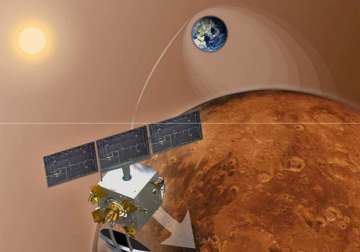Bengaluru: India's Mars Orbiter Mission payload has viewed the albedo of Mars that will be useful to study it surface properties, Indian Space Research Organisation said today.
“The map presented here shows the surface reflectance of Mars as viewed at 1.65 micron from the reference channel of MSM (Methane Sensor for Mars payload) till December 16, 2014. In the map, the blue colour indicates low albedo features and the red shows high albedo features on the Martian surface,” ISRO said on its Facebook page.
Albedo is the fraction of solar energy reflected from planetary surface back into space.
It said, “The map resolution is 0.5°x0.5° in Latitude-Longitude. By correcting the data for CO2 absorption, a major part of atmospheric effects is taken care of.” This data, along with the reflectance measured by Mars Colour Camera, will be useful to study the surface properties of Mars, a post by ISRO, along with a map representing the surface reflectance of Mars, added.
The Mars Orbiter launched on November 5 in 2013 onboard ISRO's PSLV C25 from Sriharikota entered the Martian orbit on September 2014 after a nine-month long odyssey, making India the first country in the world to succeed in such an inter-planetary mission in the maiden attempt itself.
It is equipped with five instruments, including a sensor to track methane or marsh gas, a colour camera and a thermal imaging spectrometer to map the surface and mineral wealth of the red planet.
ISRO said Methane Sensor for Mars (MSM) payload on board MOM intends to detect the presence of methane and measure the column density of the same.
It said one of the secondary objectives of this payload is to measure the reflectance of Martian surface in 1.65 micron. MSM has two channels, Methane and reference to measure the radiance from the surface of Mars.
Stating that all planets in the solar system receive Sun's radiation to varying degrees depending on their distance from the sun, ISRO in its post said, “Observing the surface of the planet depends on how this radiation is reflected back.”
It said, “Reflected solar radiation from Mars is a diagnostic signal of the planet which provides lot of information about the planet's surface as well as its atmosphere.”
“When we measure the radiance in a specific wavelength of light (in this case, 1.65 micron), then we can generate a reflectance map,” it added.
Latest India News
